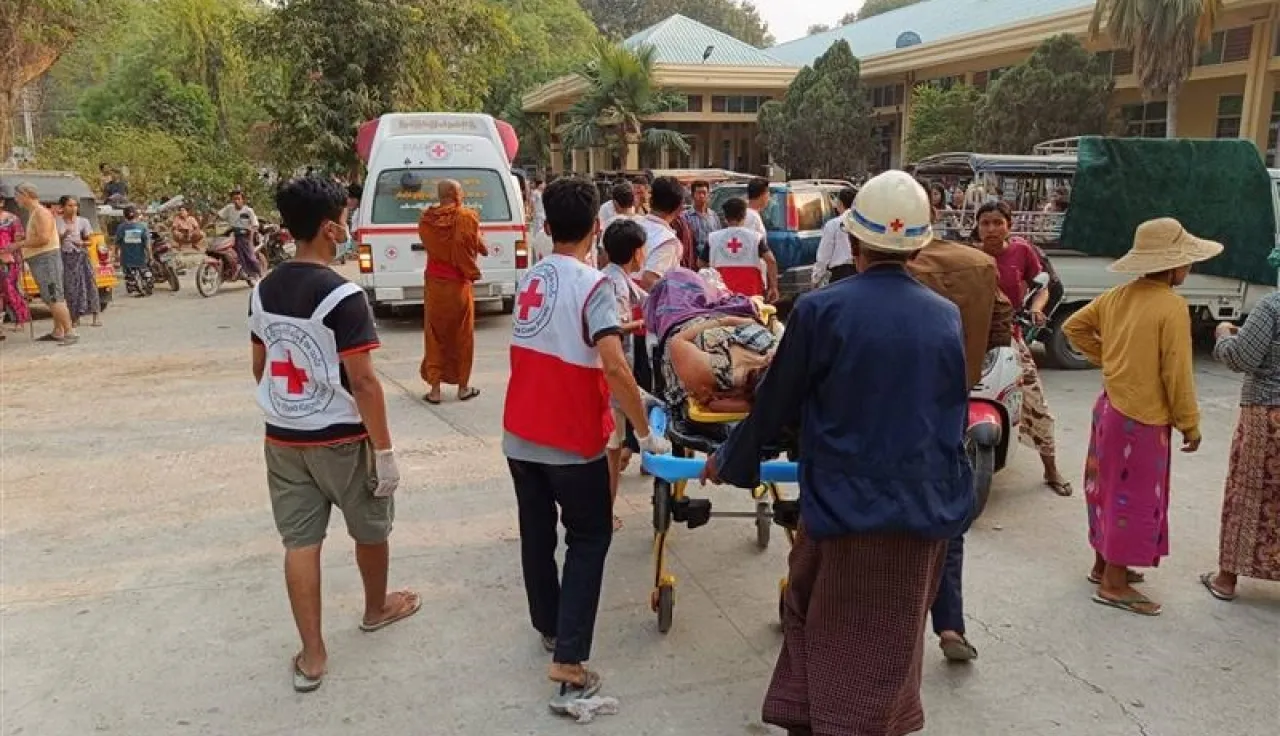To protect humanitarians is to protect communities: World Humanitarian Day 2025

On World Humanitarian Day, we honour the courage and commitment of those who put themselves on the line to bring relief in times of conflict and disaster. This year’s commemoration comes with a heavy truth: being a humanitarian has never been more dangerous.
In 2025 alone, 18 Red Cross and Red Crescent staff and volunteers have been killed while doing their work, providing vital assistance to communities that need help. Many more have lost their lives off duty - in their homes, with their families, or simply on their way to work.
Each one of them stood under the protective emblems of the Red Cross, Red Crescent, or Red Crystal - which under international humanitarian law means they should be protected and never become a target.
This loss of life is not just a tragedy for loved ones and colleagues. Each attack on a humanitarian is also an attack on the communities they serve. Every time a humanitarian is in danger, fewer people receive food, medical care, or clean water. Every convoy stopped by violence is aid that doesn’t reach people in desperate need.
Most humanitarians are from the very communities they serve. Staff and volunteers living close to crisis are often the first to respond to crisis, and they remain long after international colleagues must leave. Yet they are also the most affected by attacks.
Humanitarian workers accept measured risks to reach people in crisis. But courage cannot be their only protection. Respect for international humanitarian law is what keeps them safe - and what allows communities to receive the assistance they urgently need.
Messages from our colleagues in the field
Bargi Gul, a physiotherapist in Kabul, Afghanistan
Tweet: https://twitter.com/ICRC/status/1956611940458828121
When I wake up every morning, I am filled with strong determination and a clear aim to help the needy and the sick who are waiting to benefit from our assistance.
During difficult times, I reflect more on my professional value and strive to provide useful, accurate services to those in need, a practice that gives me strength in hard days.
My message to everyone in the world who watching and listening is this: we must extend a helping hand to those in need, regardless of their ethnicity, race, or country of origin.
Vadym Grebniev, Economic Security Generalist, ICRC, Odesa, Ukraine
Tweet: https://twitter.com/ICRC/status/1956266183209910694
When I see that people who have received assistance from us improve their quality of life, it inspires me to keep going.
Working at the International Committee of the Red Cross, I have repeatedly seen how people who received our assistance improved their food production and earned income. Overall, helping such people is my main driving force and motivation to return to my work every day.
The most difficult part of our work is stepping back... from helping people. Once, we planned to assist people in remote villages near the front line with fuel briquettes, but amid an escalation of shelling and the deaths of our colleagues during a similar trip to Donbas, we had to reconsider our mission, cancel the briquette deliveries, and replace them with cash assistance.
This is always the hardest part, as we know people are counting on us.
If attacks on humanitarian workers continue, entire communities will be left without the possibility of receiving assistance in the form that suits them best. This lifeline may be cut, people will stop receiving assistance, and their already difficult lives will become even harder. These attacks on humanitarian workers are not only attacks on us; they are attacks on the hope of people who need that hope the most.
The impact on our safe ability to help these people is a threat to losing hope for those who need it the most.
Aissata Toure, Projet hospital Mopti, Mali
Tweet: https://twitter.com/ICRC/status/1957336696942412097
What motivates me to come to work every day is the fact that I’m part of the ICRC’s major humanitarian efforts in Mali, and knowing that through my work and my contribution, lives are being saved.
The biggest challenge in a typical workday is anticipating orders. To prevent stock shortages of supplies and to prepare for mass influxes.
During emergencies, the main challenge is ensuring we have the necessary supplies or medications to treat the patients we receive at the hospital.
The message I want to share with the world today is to tell everyone that no matter what role we hold, we each contribute on our own scale to the broader humanitarian effort—and we should be proud of that.
Gegham Petrosyan, Health Programme Manager, Armenia
Tweet: https://twitter.com/ICRC/status/1957004543784263983
For over two decades I’ve been working in places where conflict has disrupted life lines and health systems. I’ve been in environments where attacks on humanitarian workers cut directly into the life line that we were trying to maintain.
I’ve seen hospitals coping with an influx of wounded people, and I have also seen hospital windows shattered by shelling. But every day I faced these risks because I strongly believe that even a small act of help has a multiplying effect.
Losing colleagues along the way was deeply painful, and I believe that it can never be accepted as “normal”.
We cannot prevent wars and conflicts, but we should ensure humanitarian space so that aid can reach those who need it most.
A call for urgent action
On this World Humanitarian Day, the International Red Cross and Red Crescent Movement issues a united call: protect humanitarians, protect communities.
We call on all states, parties to conflict and global leaders to take immediate concrete steps to protect those who risk everything to save lives. When humanitarians are attacked, it is not only their lives that are at stake – it is the lives of the people they serve. When humanitarian workers are protected, so is our shared humanity.



